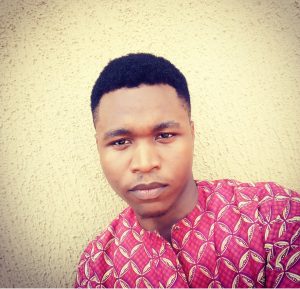Ani Kayode Somtochukwu
Gloria used to say love was the greatest redeemer. She said this with her eyes closed and fingers fondly caressing a picture of my father, her sweaty hands smudging it to her chest. When I was younger, his pictures used to hang on every wall. He looked almost regal in them; his eyes, dark and piercing, his shoulders broad and solid. He used to sit me on those shoulders as he danced around the living room with Gloria. Now all that was left of him was the emptiness of the slightly lighter wall spaces where his pictures had hung, and Gloria’s misery. She seemed almost completely gone at times, a ghost sailing through life pretending she wasn’t at all a ghost. It seemed so long ago now since she was happy, since she danced to 2face and Britney Spears and went out adorned in jewels that sparkled. It seemed so long since I heard her laugh.
I don’t remember how it happened, but I remember seeing the light in her eyes die. I thought it was one of her routine fights with my father, something that would end. She would cry, crumple into the tiny space that was my bed, and I would console her, hugging as much of her as my small hands could. She would tell me everything about the fight, even though I understood nothing of it. Days later, they’d reconcile, and the smile would return to her eyes. The last time, though, the reconciliation never happened. I waited and waited, wondering when next I would see my father. One morning, as she gave me a bath, I mustered enough courage to ask her. She didn’t answer but instead scrubbed my skin harder with the loafer. At first I tried to shoulder the pain, afraid of what would happen if I told her to stop. But I was only a child.
“Stop. Gloria, stop. Stop, you’re hurting me.” All over, I was brimming with pain. For a moment she stared at me with what I think now was resentment. Then she began to cry.
“I’m sorry,” I said. I wanted to wipe her face—it always made her smile—but I was covered in foam. She left me standing there in the bathroom and walked off. She never recovered.
It was the first time she hurt me, and for a long time I would have nightmares about it. In them I would be naked and a crying Gloria would scrub and scrub till she scraped my skin away to reveal fragile bones.
I learnt to reject love, any kind of it. Anything that could break me the way it broke her. The first time I encountered it, I was in a crowded church. The second time, it was in the back of an empty classroom on Douglas Street. The more I found it, the more I did not want it.
The first time, it was from a priest. He called to me one evening after mass as I hurried to attend to my Legion duties. And he talked and talked and talked. By the end of his speech, I had a suspicion of where it was going. He touched the collar of my shirt, as though to fix it. “You know, you’re such a beautiful boy,” he said.
He was a little ostentatious with his love, at least to the point that was possible for a priest. He overwhelmed me with his words; at night they suffocated me. They pressed into me like branding irons. He wrote them in notes and slid them in my pocket before I left his room, as though writing them on paper would make me realize how true they were. I tried to avoid him, hid among my Presidium members, came to mass late and left before it even ended. But he was relentless. If he knew I was afraid of him, he did nothing to alleviate that fear. Even after I stopped hiding, I was always apprehensive of his kindness and his promises. After he left, I kept his notes. “I love you,” they said. “More than anything. And I always will.”
No one had ever loved me that much, and even after he abandoned me, I wanted to keep that feeling for as long as I could. It took me many years and Tony’s deep brown gaze to bring myself to burn the notes.
“He used you,” Tony said.
I shook my head slowly. “No…”
“He did.” Tony said. “You were young and he used you. You have to get rid of these notes, all of them.”
I don’t know why I decided to get rid of them by burning, but there was a poetic sorrow in watching the fire lick up his calligraphed words, slanting and stretching as though marked by some truth.
◊ ◊ ◊
When I was little, I spent most nights frightened of sleep, scared I would die in my sleep or worse, wake up to realize Gloria had died in hers.
“The world takes and takes and takes,” she used to say. “Only He can give.”
The fear of losing her warped my dreams. After my father left, she embraced God so fanatically that I thought one day she would leave me behind to be with Him. I looked forward to the morning, to dawn and the reassurance that came with the sound of her slippers clapping against the concrete floor. I never told her of this fear. Even that young, I knew such infantile insecurities were not something a child could share with a mother like mine. I learned early to guard myself, as much as was possible, from her. Many times, it seemed she was trying to keep me unhappy, in an emptiness that gnawed and whispered its presence. Perhaps “unhappy” wasn’t the word. Whatever it was, she held me in it with her. It was painful sometimes, the way her life was void even with me in it. Such disconsolation was something a child should have been able to make small. I told myself it wasn’t me, that her misery wasn’t my guilt to bear. Still I walked under its weight. In my second year of university, in the middle of my biggest fight with Tony, he called it a burdened childhood. Burdened. It sounded so attenuated. He never fully understood me. The fight had been because of this. I was telling him about the day Gloria locked me outside wearing nothing but her slender green dress and he said, “You have to forgive her. You’re holding in so much pain. You have to let it go.”
“Sorry, I’ll keep it to myself.”
“That’s not what I meant.”
“Fuck you.”
The next day, he apologized, holding me from behind as he whispered his regrets in my ear. “I would hate for you to ever think I wasn’t here for you. To share whatever. I was such an asshole yesterday.”
Many times I tried to show him but it was hard to make him understand. It was hard for me to explain, even to myself. I wasn’t excessively beaten or starved. She drove me to school each day and told me Bible stories each night as she wooed me to sleep.
When I began to have breakdowns, she was the only one I had. When they came, they swooped down like black brimming clouds and encircled me, like layers and layers of cloth rolled around till I found it hard to breathe. A sign, my body twisting itself into misery.
The first time it came, I was merely a child. She sat next to my teacher with a face contorted with worry. It was after I first saw death. I had seen life beaten out of a man and it scarred something in me; the way a blunt object impressed itself violently into a helpless surface.
“He’s just looking for attention,” she said to him. “I’ve been so distracted by work recently. I’ve not been there for him.”
My grades had sunk and not even the threat of the cane could give me the zeal with which to do my classwork. My teacher, Mr. Okenwa, called me to his table. “You didn’t answer your exercises again,” he said. When he made to touch me, I flinched.
“I’m not going to hit you,” he said. He put the back of his palm against my neck. “You don’t seem to be sick. What’s wrong? Tell me.”
I began to cry. He was so alarmed, he called Gloria. She drove me to Mr. Biggs and bought me a big bowl of ice cream. I swallowed each spoon with an exaggerated smile on my lips. I did not want her to be frightened for me, the way I was for myself. Standing on my neighbour’s veranda, I would imagine how quickly I would die were I to jump. Would my death be quick, or would I writhe in pain for a long time before rest came?
The second time the breakdown came, I actually planned everything out. I would wait till her blood pressure medication ran out and when she bought a new bottle, I would swallow every last pill and go peacefully in my sleep. In the weeks that led up to that breakdown, I almost found happiness in a boy named Ikenna; in his wide-faced grin and bushy hair and the way he said, “Come and see me nah… You know you have a good time each time you come to Douglas Street.” In the way he held my legs in his laps as he clipped my toenails, his hands caressing my feet. I was almost happy. Gloria found out about him and she tried to break me, perhaps because broken things could more easily be reshaped. It hurt more to know she was trying to hurt me, choosing her words as carefully as possible to affect the most damage. That time my nightmares returned with renewed intensity. I would wake to my limbs paralyzed and in so much pain that I would scream and scream till she ran into my room and held me to her bosom and blew air into my face.
“It’s just a dream nnam. It’s a dream. Shhhhh. It’s okay now.”
In the morning when she asked what I was dreaming about, I said I couldn’t remember. I planned everything. I even wrote her a note.
Who will stay with you now? Who will be there for you to hurt with your words?
Gloria was so scared she took me to see a doctor.
“I think he’s depressed,” the doctor said.
“What do you mean, depressed?” Gloria asked him, “What are you saying?”
“Your son is showing signs of clinical depression.”
That night, she cried. “Am I a bad mother to you? Tell me. Am I not doing my best?”
The breakdowns came more and more often. Sometimes with so much physical pain that I doubted I would survive it, and if I even wanted to. Many times it seemed this body of mine had been on so tiring a journey and craved only rest. There were times the bouts came as a surprise. Other times, I was already sitting in my sadness expecting it.
The first time I saw death, I was seven or eight or nine, one of those. I spent the years that followed trying to forget, trying to purge myself of the pictures and the screams. It was no ordinary death. It was the death of a man whose only crime was loving or trying to love. I don’t remember what he looked like, but I remember him. I remember his bowed head and raised hands trying to shield all the blows from death. Sometimes I practice that. I kneel on the floor and raise my hands just to see how easily I can. Other times I imagine his frame there on the dirty road with my face, and my voice saying, “Please! Please, I’m an only son.”
And not only because those were the exact words I remembered him saying. I imagined those words would come easily to me were I surrounded by death. It was the first time I heard, saw, someone die. Death beat him with wood and planks and plastic, anything Death could find. Death kicked him and slapped him and stabbed him with words.
“Aru,” Death said, “Abomination. You are a disgrace to humanity. You are sin.”
I died too, in a way. As Gloria explained it to me at home, a part of me shriveled and desiccated slowly into the breeze.
“This is what happens to boys like you. If. You. Don’t. Change. Inugo?”
I dreamt of the man’s weakened body lying on the road, still, as though one with the earth. I dreamt of it many times wondering what became of his mother after she saw the body of her only son.
◊ ◊ ◊
There was little solace to take in the promise of leaving. I knew it would hurt me when the time came. I was all she had, I knew this. Leaving was only a necessary evil I needed to do for myself. When I received my admission letter, I did not celebrate it. All I could think of was Gloria and how her voice broke as she told me to go as far away as I could go.
“Why only Agbani? Agbani is close. Go to Zaria,” she said.
The day I left for school, she sat in the living room watching my every move as I dragged my things out to the door. Her scarf was tied firmly around her head, enclosing her ears and coming close to taking her eyebrows too. It reminded me of a story she told me, of Abraham and Isaac and the sacrifice of God’s redeeming love.
“You see, Abraham loved God. So great was his love that he would give God his own son, his only son. Only few people get to love like that,” she said, her eyes far away.
“Gloria?”
“Yes, my love.”
“I love you like that. I love you like Abraham loved God.”
She laughed, a loud mocking sound. “My boy, you’re just a child. What do you know?” she said, caressing my scalp.
When I said it to Tony, he laughed. “You love me like Abraham loved God? What does that even mean? Also, I thought you were no longer into God?”
I laughed too, more out of shame than mirth.
“Well.” I shrugged.
After I explained what the phrase meant, he came over and held my head with both his hands.
“I love you too, more than anything. You’re next to God for me too.”
In the beginning I found it hard to believe those words. I craved hearing them but even then, I did not fully believe them. It seemed to me like only a matter of time before I woke up and realized it had been some sort of mistake, and that the warmth I felt when he smiled at me was only a cruel ironic dream.
He had a smile that charmed, that lit up his entire face, his eyes almost sparkling. I felt myself falling for him if that was ever possible. I knew I couldn’t have him, but what was it they said about love? Something about how it made you feel safe, placing your heart with someone you knew could not care for it the way you needed it cared for. Something like that. Every time he left my room, I thought to myself that he was never coming back, and yet each time he did, wearing the same boyish grin, and those hands that felt like sanctuary. When he took me in his arms, he pressed me so close into the warmth of his body that I felt like a baby swaddled in its mother’s bosom. I had no idea why he kept coming back. I didn’t understand what was happening between us—the way he put his hand around my shoulder when he saw me at the cafeteria, the way he lifted me and kissed my neck and left crimson marks there but always stopped just before it became too sexual. I wanted to ask him but I was afraid I’d scare him away. Eventually when he explained himself to me, I decided it did not matter.
◊ ◊ ◊
Gloria locking me outside wearing her dress was a recurring plot in my nightmares. Each time I dreamt of it, I woke with a painful tightness in my chest. Sometimes it was bearable, this pain. Other times I had to lie in bed and wait for it to pass.
When it first happened, I was eight and home alone. I decided it was as good a time as any to try on her sleeveless dress. I loved that dress. I loved the way it crawled over her body marking every inch out for attention. It was huge on me and the hem bunched up at my feet, but I loved how elegantly it hung on my bare shoulders. So enamored was I with my reflection in the mirror that I did not hear her return from her errand. Her sigh of disapproval startled me only seconds before she gripped me by the arm and yanked me to the living room.
“What do you think you’re doing? What nonsense is this?”
When I tried to speak, she slapped me so hard I tasted blood in my month.
“What did I do to deserve a child like you? Why is God punishing me?”
After she pushed me outside and locked the bolts, I simply stared at the door, too shaken to even process what had happened. Soon, other children began to gather. The adults simply laughed and asked what joke Gloria was playing? The children, they saw, laughed and ran off to call more people.
“If you want to disgrace me you have to disgrace yourself too,” she said later that evening. “Pikin wey say im mama no go sleep… You have to know that this shameful path you’re on is a disgrace to you first. God knows I’m trying my best to raise you well.”
The thing is, maybe God didn’t know anything about happiness or a burdened childhood. Maybe God didn’t have a clue how to be a child trying to please his mother and trying to fit into himself at the same time. Or maybe he did but didn’t care. Tony detested me saying things like that about God, but he didn’t have a burdened childhood, so what did he know?
My relationship with God was as troubled as my relationship with Gloria. I did love God but I knew He didn’t love me or couldn’t love me, or maybe his love was stretched too thin across seven billion people. He never gave me solace. She took that from me too, what with the way she invoked his name.
“You know He can see you. And you know He cannot behold sin. You know.”
◊ ◊ ◊
The first time I told Tony about Gloria, he said, “You call your mother by her first name?”
I had no explanation to give him. I had always called her Gloria, for as long as I could remember. I had no memories of calling her anything else. Only ones of her waving away people’s protestations. There’s a faint memory of my father explaining that I refused to speak for so long that when my first words were a baby babble variation of Gloria, she welcomed it with all gladness.
“That’s just weird,” Tony said. “She’s your mother. Is it because of the issues you people have? Is that why you don’t call her mum?”
“No.”
“Hmmm,” he said. “Okay o.”
I could tell he didn’t believe me. I wanted to say something disparaging to him, perhaps ask him why a homoromantic asexual was making categorizations for other people on what was weird or not. But he was so innocent, to an almost childlike extent, I knew he meant no malice. I knew how sorry he would be if only I managed to show him how much it hurt ne, the way he listened but never understood. In the second semester of my third year, Gloria had a mini stroke. No big deal, the doctors said, it wasn’t a real stroke, but she had to stay in the Federal Teaching Hospital at Ituku-Ozala for observation. The day we went to see her, he did it again. There were things about me he couldn’t understand, a fogged glass door I did not know how to wipe clear.
It began pleasantly. Gloria was gracious with Tony like she was with everyone else.
“This one is quite tall,” she said to me when Tony excused himself to use the bathroom. “I see you don’t intend to quit this your depraved way of living any time soon,” she continued.
“That’s really my business, Gloria, not yours,” I said.
“It’s my business if you refuse to straighten your path.” She began to say. The words caught in her throat and she started to cough, then the tears came. “Where did I go wrong with you? What evil did I ever do to deserve this? I don’t know what I did. Why are you doing this to me?”
We left as soon as he came back from the bathroom.
“She actually seems like such a nice person, your mother,” Tony said, back at school.
“What the fuck is that supposed to mean?”
“I’m complimenting your mother. Is that one now also a crime? You just want to pick a fight.” He looked startled.
“I just want to pick a fight?”
“Well, it seems, because what the hell did I do?”
I stared at him for a moment and decided not to push it, to let it all just wash away. I silently undressed and crept into bed, closed my eyes and tried to ward my tears away.
◊ ◊ ◊
I suffered my most severe bout that semester. This time I couldn’t even keep food down or find the strength to take a bath or go to class. On the mornings Tony came, I put clothes on and walked with him to school but it all floated past me. The world had once again adorned its worst gray. Weeks before it hit, I felt myself slipping, in free fall, my nightmares more frequent, my weariness overpowering. Perhaps it started in the deepening distance between Tony and I as he immersed himself more and more in preparations for his final exams. He seemed now to brush me away so expertly. Unplucking my hands wrapped around his back and gently pushing me away.
“Just hold me,” I begged if I was desperate enough.
“I’m busy,” he would say. Reading, writing, slipping away from me. School was the anchor tethering him to me, I knew. Once, I held onto him and pulled him with me to the bed.
“What the hell. You’re distracting me. Stop.”
We struggled on the bed. Me trying to hold his weight on top of me, him trying to pry my hands off.
“I just want to feel your warmth. Let me just feel your weight.”
He started laughing.
“You say the weirdest things,” he said and tickled me. Eventually I let go and watched him sit back up. He adjusted his shirt and straightened it out where it was crinkled.
“Oh, come on. Don’t be like that,” he said.
The closer the exams drew, the more the realization dawned on me.
It was the first bout Tony witnessed me go through. It scared him. He watched on, his eyes cloudy with dread, and something else I could not name. Pity, perhaps. He tickled me, buried his nose in the nape of my neck, held me.
“Talk to me,” he said, “You can talk to me. I’m right here.” But there was nothing to say.
“Hey,” he would say hugging me close to himself. “Hey, I’m beginning to worry about you.”
“I’m fine,” I would say, “it’s just a little fatigue.”
One day he kissed me with a sort of seriousness, his eyes a liquid pleading look.
“No,” I said. “Tony you don’t have to.”
“Shhhh…” He kissed me again. “I want to.”
He reached down and slid his hand through the band of my shorts, and this time when he kissed my neck, he dragged his kisses slowly to my chest, flicking each nipple with his tongue.
I ran my hand along the length of his thigh. My hands were heavy as you unbuckled his belt. He was barely hard.
“Tony, really, you don’t have to do this,” I said again. He brought his head back up so he was staring into my eyes, his forehead resting on mine. I had imagined this with him so many times, and now the guilt of it sat in the hollow of my bones. It frightened me that he was this worried about me. I felt so light, full of defeated air, like his hands on my chest were the only things holding me from floating away. When he brought his face back up to kiss me, tears bubbled up my throat. I turned away from him.
“No, no, no… Don’t cry.”
“I’m sorry. I’m sorry.” I wiped my face and tried to still my nerves, but the tears only stayed away so long. Gloria once told me a story of the impenetrable walls brought down by the sheer sound of music, and how the Israelites jubilated as they stepped over the rubble. I used to wonder about those people that lived in that fortressed city, what they must have felt the moment it became obvious to them that their walls would crumble. Tony sat back on the bed, his eyes soft with pity.
“Don’t leave me,” I said. “Please. Please.”
He held my shaking shoulders and wiped my tears away.
“I’m never going to leave you,” he said, and I buried my face in my palms. It was a promise I knew, even then, that he could not keep.
 Ani Kayode Somtochukwu is a short story writer and poet. His work has appeared in Tuck Magazine, The Rustin Times, Ake Review, Bakwa Magazine, Enkare Review, Gertrude, and After the Pause. His poems were shortlisted for the 2017 Erbacce Poetry Prize. He has a BSc. in Applied Biology from the Enugu State University of Science and Technology.
Ani Kayode Somtochukwu is a short story writer and poet. His work has appeared in Tuck Magazine, The Rustin Times, Ake Review, Bakwa Magazine, Enkare Review, Gertrude, and After the Pause. His poems were shortlisted for the 2017 Erbacce Poetry Prize. He has a BSc. in Applied Biology from the Enugu State University of Science and Technology.






